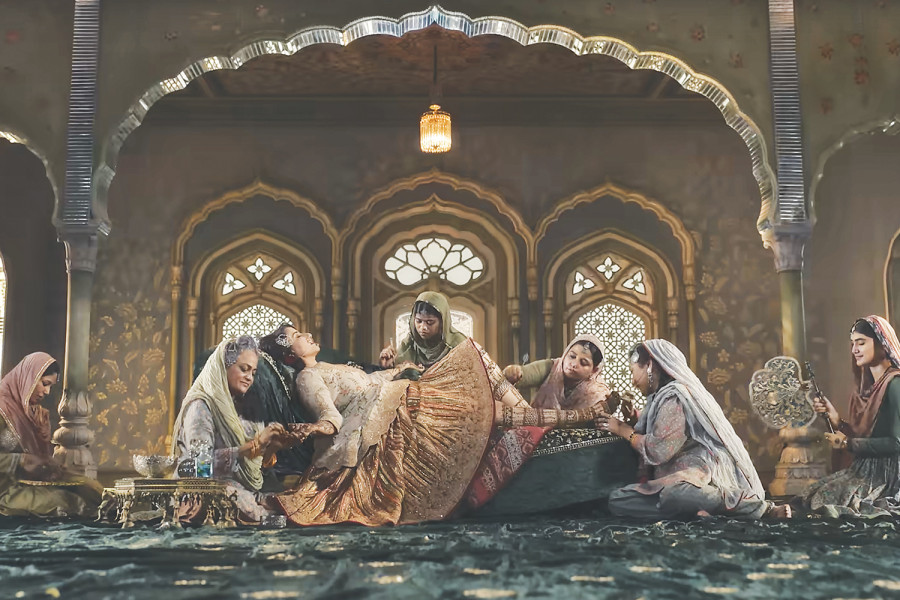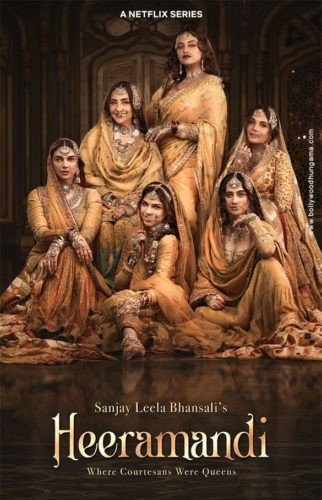Movies
Glamorous visuals, stale storytelling
‘Heeramandi: The Diamond Bazaar’ delves into the lives of tawaifs during the British Raj.
Manushree Mahat
Anyone who's seen Sanjay Leela Bhansali's movies knows that the director loves glamorous settings. Whether the story hits the mark or not, he always showcases elaborate and rich production designs. The Shahi Mahal of Heeramandi follows this trend.
Here the glitters of the Mughal riches with its glimmering pools of water, and the golden hues of the riches stand as a sharp contrast to the painful turmoils of the courtesans living there. Tawaifs, as they have been known for centuries in the Indian subcontinent, hold the fort down in this bungalow, led by their hard-hearted, bordering-on tyrannical matriarch, Mallikajaan (Manisha Koirala).
The tawaifs here enjoy the power they have over the nawabs—socialising with the elites, dancing in their ceremonies, singing in their companies, and accompanying their beds. They also bear the ostracism of society—even from the same nawabs, who themselves don’t bear any blame for the numerous infidelities they engage in with the tawaifs.
Here, Mallikajaan creates a strict environment—every daughter born in Heeramandi is destined to become a tawaif, with no freedom from this lifestyle or the option to fall in love.
In what is ‘Heeramandi’’s weakest side plot, not shockingly, the naive and sweet Alamzeb (Sharmin Segal) becomes infatuated with Tajdar, one of the few nawabs, who doesn't engage with the tawaifs of Heeramandi. Tajdar’s straight-laced characterisation serves against the greedy and unfaithful nawabs that control Heeramandi—a dreamy, wealthy loverboy with also a penchant for rebellion.
Alamzeb also stands out as different from those around her—untouched by the worst aspects of society, too obedient to goodness. She has not yet entered society as a tawaif and is determined not to become one. Despite tackling provocative issues, Segal's portrayal of Alamzeb lacks dynamism, and the actor's poker-faced performance doesn't help her single-minded character. Throughout the story, Alamzeb remains solely focused on her love for Tajdar.
Despite having significant screen time, these two characters bring minimal emotions to their stories. A love story is not what Heeramandi needed, especially one that is prophesied to be doomed from the start.
And here comes Bhansali’s greatest limitation—beautiful cinematography cannot replace a weak plot, no matter how well his actors fit into the production. Both Mallikajaan and Sonakshi Sinha’s Fareedan are the show's highlights, seamlessly integrating into the emotional context of their livelihood.
Koirala portrays Mallikajaan as a ruthless tyrant, manipulating her palace subjects regardless of the damage caused, to maintain the life and status of a tawaif. The dialogue writing does justice to her character as well, with lines like, “Ye Mallikajaan ka daman hai, itne se khoon se inki pyaas nahi bujhegi,” among many memorable dialogues.
Sinha, on the other hand, has rarely enjoyed villainy in her illustrious career. She seamlessly blends into the drama of Heeramandi as the revenge-seeking diva who commands a subtly vicious aura in her presence.
However, Bhansali creates interesting characters without really knowing how to handle their arcs. Fareedan, who spends most of the series resolute in her agenda to avenge the injustice she suffered in her childhood, suddenly changes sides in what feels like a lazy, abrupt turn from her characterisation. This is also true for Sanjeeda Sheikh’s Waheeda, whose splendid acting channels all the malice of her character without the support of strong writing.
When done well, women coming together to fight a common enemy that oppresses them—in this case, the British Raj—is a powerful message. But Bhansali's loose grasp on his characters' motivations and the drama he presents without a clear direction for the story leads to the plot unravelling near the end.
Except for a select few, Heeramandi is blessed with a talented cast that otherwise saves the sinking ship. Watching Aditi Rao Hydari’s nuanced portrayal that doesn’t overdo it does justice to the restrained and clever Bibbojaan, who serves as a spy for the rebels while playing the role of a tawaif for the elites of Heeramandi.
Then there is Ustadji, played by Indresh Malik, who brings a certain charm to the duplicitous messenger cum meddler, but the stereotypical depiction of the queer character again shows the incompetence of the show’s writing.
This is also true of Lajjo, played by the dynamic Richa Chadda, whose brief role exemplifies the themes of tragic fates suffered by women in Heeramandi, often at the cost of men.
Leaning on natural, uncomfortable moments of sadness—drinking and falling in despair and faking a happy life with her lover to hide the reality—Chadda's character captured the authenticity of her heartbreak, evoking her motivations and desires in all their doomed despair. Segal herself couldn’t portray this in the later part of the series when she, too, is betrayed by her lover.
The tragedy in ‘Heeramandi’ is foretold, where the tawaifs played a significant role in the Sepoy Mutiny of 1857 in real life. According to an article published in Scroll, the tawaifs stood with the rebels against the British Raj, using their kothas as hiding places for the rebels.
Knowing this, it's not surprising that the series takes a darker turn at every turn, but the screenplay falls short of integrating this major aspect of history into the lives of tawaifs.
If we had seen the tawaifs warming up to the rebellion early in the show (which is only true of Bibbojaan as a spy for the rebels), their transition to join the rebellion would have worked much more smoothly. Instead, it happens in a drastic and highly disturbing series of events, among which Mallikajaan is gang-raped by the British police.
'Heeramandi' could have been so much more than what it was. Glitz and glamour are all good and great, but so is investing in a story that does justice to the real-life heroes that were the tawaifs erased in Indian history.
A doomed love story like that of Alamzeb and Tajdar makes sense, as it emphasises the sacrifices the tawaifs and rebels had to make for freedom. But its subpar execution makes it a flaw—a boring one at that, more than anything else. ‘Heeramandi’ is gifted with much beauty; we just wish it were also gifted with better writing.
Heeramandi

Director: Sanjay Leela Bhansali
Starring: Manisha Koirala, Sonakshi Sinha, Aditi Rao Hydari, Sharmin Segal
Episodes: 8
Language: Hindi
Year: 2024




 20.53°C Kathmandu
20.53°C Kathmandu












